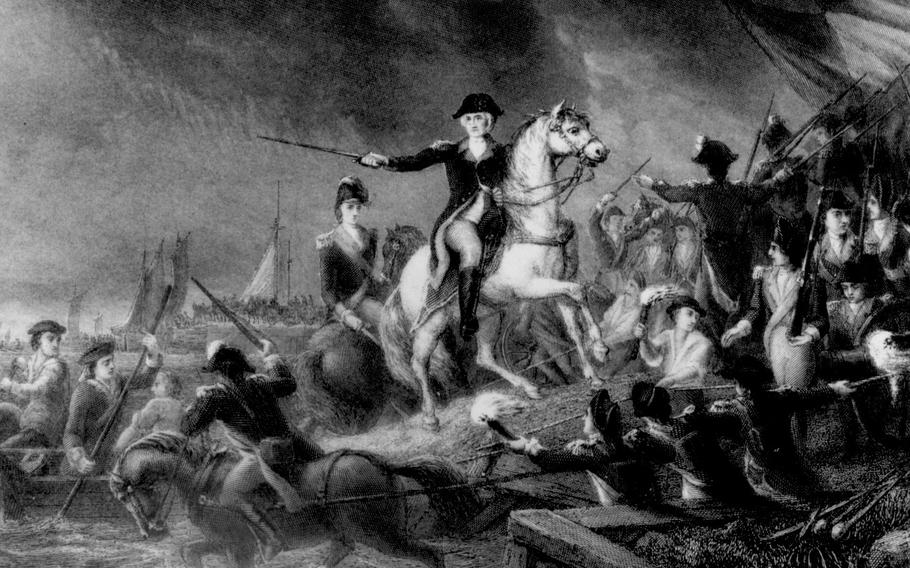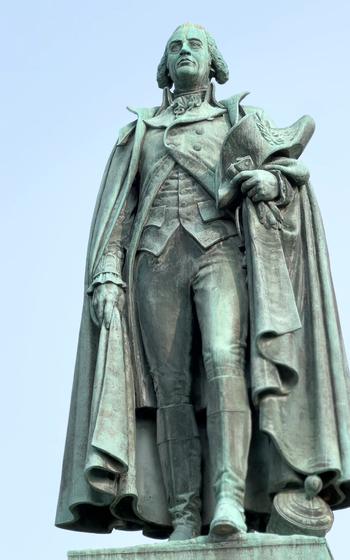
General George Washington leaving New York in 1776, a few weeks after a plot to assassinate him was foiled. (Library of Congress)
Had it all gone differently, the White House might have been located in Ward, D.C.
And the residents of the nation’s capital would have been, what, Wardians?
Because the first true commander in chief of the armed forces to lead the Revolutionary War was not, as many believe, George Washington. It was a man named Artemas Ward.
And because Washington came along three months into the war and quickly overshadowed Ward — taking his command, allegedly joining in on trash-talking him and making him his underling — Ward is known for little more than the thunderdome of a traffic nightmare that encircles his statue in a leafy part of Northwest Washington.

The statue of Artemas Ward is in the middle of Ward Circle in Northwest Washington. (William Neff/The Washington Post)
As the nation pays tribute to the U.S. Army on its 250th anniversary, little has been said about the true father of the force who held a grudge against Washington much of his life, historians say.
He was called a “joke of a warrior,” an “old church warden” and “a fat, old gentleman” by officers who resented Ward’s appointment to lead the patchwork Colonials as a unified army to chase the British regulars out of Lexington and Concord and back to Boston.
Washington, some historians said, didn’t back him up and joined in the mockery, according to some accounts.
“The sickly and rather portly Ward continued in public service as a judge and Massachusetts representative in the First and Second Congresses, all the while nursing a quiet but intense dislike for Washington,” New York University history professor Rebecca Anne Goetz wrote in 2005 when she was a doctoral student at Harvard University, Ward’s alma mater.
Even when an imposing bronze statue of a dashing Ward was unveiled in the nation’s capital, it was met with a collective “huh?”
“We blush to admit a paucity of knowledge in the General,” the Washington columnist for West Virginia’s Hinton Daily News wrote on Sept. 20, 1938, when the statue was announced.
Park officials in D.C. were flooded with complaints from residents demanding to know why the nation’s capital would honor a comedian from the mid-1800s.
Charles Farrar Browne, a humorist who wrote and performed as a character named “Artemus Ward” and once entertained President Abraham Lincoln, is considered America’s first standup comedian and far better known than the general.
“Artemas Ward and ‘Artemus Ward’ should not be confused, although local guides predict that they will be by tourists for some years to come, in spite of everything that will be done to straighten out the identities for them,” wrote the Hinton columnist, who then filled the rest of his story with quotes from the humorist and none of Ward’s military achievements.
He would perpetually be Paul Allen to Microsoft’s Bill Gates.
Recognition was a constant struggle for Ward, although he was a decisive leader and vocal rebel.
A bookish child among his brothers, his father sent him to Harvard College at 16. After graduation and some years teaching, then getting married, Ward moved back to his hometown of Shrewsbury, opened a general store and was elected to local offices, according to the 1921 book by Charles Martyn, “The Life of Artemas Ward: The First Commander-in-Chief of the American Revolution.”
He was called to service in the British Army during the French and Indian War on Jan. 28, 1755. For several years, he cycled in and out of public service of two kinds — taking up arms and pushing paperwork. Often, his military career and public office work looked similar.
As one of nine officers demanding better provisions to prepare for the “general invasion of Canada,” Ward demanded “camp furniture, particularly kettles and haversacks,” Martyn wrote.
He saw action in the siege of Fort Ticonderoga, surviving the bloody skirmish and earning a promotion to lieutenant colonel. But the long march and grueling time in the field made Ward ill. “He indeed never regained robust health,” Martyn wrote.
He was a warrior of words, however, outspoken and bold in response to the British Parliament’s taxation of documents and printed materials with the 1765 Stamp Act.
Ward was instantly recruited and lionized in the political protest universe. The British noted his rising political power and decommissioned him in 1766.
Ward thrived as he increasingly became a powerful voice of dissent, backing Samuel Adams during the Boston Tea Party and advocating for the stockpiling of weapons and supplies to defend Massachusetts.
Ward was sick in bed when riders galloped through Shrewsbury with news of the attack at Lexington. But he got on his horse and rode in, taking command of the forces.
The militia beat back the British regulars, sending them to Boston in the first American victory of the Revolutionary War.
“The risk of punishment for treason was much greater when Ward assumed leadership than when Washington took hold,” Martyn wrote.
Ward and the rest of the early rebels had only the Massachusetts forces to back them up. By the time Washington came on the scene in the summer of 1775, 13 colonies had his back.
Taking control and leaning on his bureaucratic expertise, Ward took command of logistics, ensuring everyone — even the enemy — was provided for.
“The public will hardly believe that so fair and generous an enemy could be guilty of barbarity and cruelty,” a London writer said of Ward’s treatment of English prisoners of war, according to Martyn’s book.
Ward wasn’t a brilliant or flashy leader, but he was masterful at amassing an army, building supplies and running logistics, according to historians including Martyn.
Ward was named commander in chief of the Massachusetts forces on May 19, 1775, and continued to command the forces besieging Boston, sometimes from his sickbed.
The Battle of Bunker Hill on June 17 was under Ward’s command. Though it was a British victory, Ward’s soldiers inflicted more damage, wiping out nearly half of the British forces. By this time, the Continental Congress brought Washington in, gambling that his robust military record and stature as a Virginian would help unite the colonies. Despite Ward’s poor health, Washington made him his major general.
Ward’s health declined, and he pleaded with Washington to be sent home over the next year.
“I am now to inform your Excellency that I am in such an ill State of Health that I do not think myself capable of doing the duty which to be done by me,” Ward wrote to Washington on March 22, 1776, from the camp at Roxbury.
“… I must beg leave to resign my Command & to withdraw from the Army after the expiration of this month. I am Your Excellency’s most Obedient Humble Servant,” Ward wrote.
Washington refused his resignation.
Ward was at last allowed to resign in 1777, dogged by rumors that Charles Lee, with whom he served in the Seven Years’ War, slandered him — resentful to be under the command of someone more bureaucrat than battle hero. There were others who allegedly spoke ill of Ward — especially his health — through snide remarks in letters, Martyn wrote.
Washington and Ward never publicly hashed out their alleged beef.
Ward went on the serve in the Continental Congress, as a state senator in Massachusetts and in the U.S. House of Representatives.
He died in October 1800 after two strokes, his passing abruptly listed in the “Deaths” column of local papers.
In November, the Massachusetts Mercury elaborated with a larger obituary listing his accomplishments, ending with an important assessment of his time as the American Army’s first commander in chief.
“Ye veterans, who search for laurels amidst the heaps of slain,” the paper said, “respect the memory of a man who was a soldier from principle and patriotism, not from pride of ambition.”